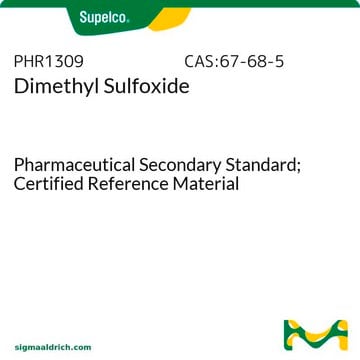PHR1155
Octyldodecanol
Pharmaceutical Secondary Standard; Certified Reference Material
Synonym(s):
2-Octyl-1-dodecanol
About This Item
Recommended Products
grade
certified reference material
pharmaceutical secondary standard
Quality Level
Agency
traceable to Ph. Eur. O0101000
traceable to USP 1477808
API family
octyldodecanol
CofA
current certificate can be downloaded
technique(s)
HPLC: suitable
gas chromatography (GC): suitable
refractive index
n20/D 1.453 (lit.)
bp
234-238 °C/33 mmHg (lit.)
mp
−1-1 °C (lit.)
density
0.838 g/mL at 25 °C (lit.)
application(s)
pharmaceutical (small molecule)
format
neat
storage temp.
2-30°C
SMILES string
CCCCCCCCCCC(CO)CCCCCCCC
InChI
1S/C20H42O/c1-3-5-7-9-11-12-14-16-18-20(19-21)17-15-13-10-8-6-4-2/h20-21H,3-19H2,1-2H3
InChI key
LEACJMVNYZDSKR-UHFFFAOYSA-N
Looking for similar products? Visit Product Comparison Guide
General description
Application
Analysis Note
Other Notes
Footnote
Recommended products
related product
Storage Class Code
10 - Combustible liquids
WGK
nwg
Flash Point(F)
370.4 °F - open cup
Flash Point(C)
188 °C - open cup
Certificates of Analysis (COA)
Search for Certificates of Analysis (COA) by entering the products Lot/Batch Number. Lot and Batch Numbers can be found on a product’s label following the words ‘Lot’ or ‘Batch’.
Already Own This Product?
Find documentation for the products that you have recently purchased in the Document Library.
Customers Also Viewed
Our team of scientists has experience in all areas of research including Life Science, Material Science, Chemical Synthesis, Chromatography, Analytical and many others.
Contact Technical Service









![10,11-Dihydro-5H-dibenz[b,f]azepine 97%](/deepweb/assets/sigmaaldrich/product/structures/282/468/27ed6f23-3d01-4628-8293-f0051a6f3b7c/640/27ed6f23-3d01-4628-8293-f0051a6f3b7c.png)




